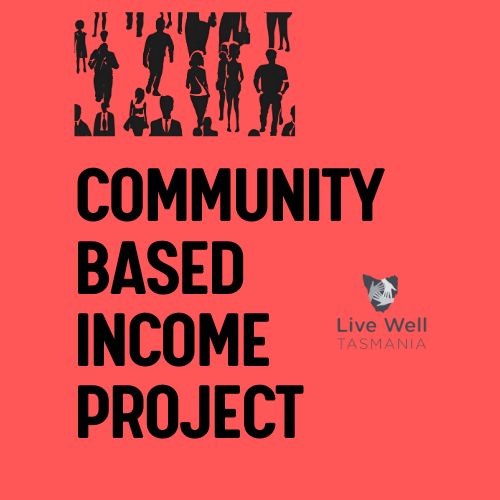Live Well Tasmania Community Based Income Project
Live Well Tasmania (LWT) is a non-profit community group in North-West Tasmania aimed at increasing health and wellbeing and building community capacity and resilience. In 2022 LWT commenced a campaign for a trial for a Community Based Income (CBI) in North-West Tasmania. A CBI aims to address four problems in the short term which both affect individual health and wellbeing and our collective capacity to act:
- unemployment
- poverty, particularly inter-generational poverty, and rising costs of living
- a non-fit for purpose welfare system
- the lack of work that could be happening in our communities to improve life for everyone, including promoting conversations about what we value
In essence a CBI is a liveable wage paid to those who provide a good or service deemed to be directly or indirectly of benefit to society, including providing caring services, engaging in education and training, and other activities that increase health and wellbeing. Person-centred care and co-design are key principle’s of this project, such that the community in effect decides how participants are deemed eligible for the income, with a high priority being placed on seeking out and understanding what is important to participants for their health and wellbeing.
There are two main rationale’s for an initial focus on conditional versus an unconditional income, one is that it is likely to be more politically feasible to get support for a conditional income, and secondly that it provides a significant opportunity for community building, for improving our local health and education systems, and collective decision making structures and agency.
Some examples of community projects that could be achieved via a CBI:
- Food Security projects – ensuring everyone has access to healthy, food, grown in environmentally friendly ways, and using the power of food for greater social connection and inclusion
- Helping kids get a better start in life, help them be lifelong learners, help families raise healthy kids
- Environmental regeneration
- Easing the housing crisis – connecting up and actively supporting house sharing such as between retiree’s and students, promoting tiny houses
The preferred model of the trial is to have three trial sites, the first trial site based on a conditional income could be Waratah-Wynyard, a second trial site based on an unconditional income could be Penguin/Central Coast, and a third with no intervention such as Burnie or Smithton, to compare the outcomes.
Possible outcomes sought and methods of measurement (in italics)
Increases of mental and physical health, reduced stress levels – surveys
Increase in skills of value to society (ie more ‘productive’ people) – identification of beneficial/targeted skills & survey to measure their achievement or otherwise
Increase in collaboration, including increased deliberative processes – survey, and quantitative measurement of deliberative events
Increases in capacity to reduce environmental pressures – quantitative measurement of environmental projects implemented, survey of efficacy of initiatives
A well supported/co-created/co-designed, diverse list of community projects and other opportunities for participation that directly or indirectly improve neighbourhoods and eg health and education and collective decision making structures– surveys with key stakeholders
Government funded and non-government funded components
We are currently investigating having two parallel processes: the first being the campaign for government to fund a trial, the second is based on private fund raising such as via donations, crowd funding and philanthropy. The latter aims to demonstrate firstly a level of commitment to the basic concept, and that the assumptions underpinning the concept are valid.
Please contact Robin on 0421 461 724 if you want to be involved or for enquiries.

